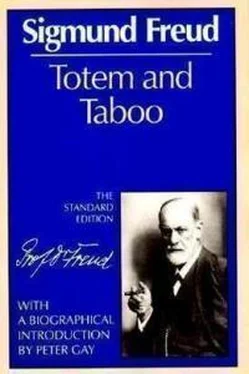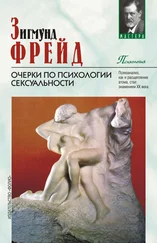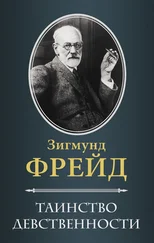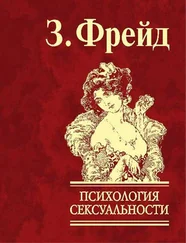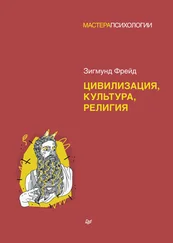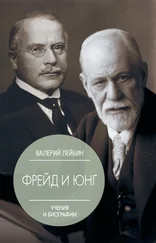Зигмунд Фрейд - Totem and Taboo
Здесь есть возможность читать онлайн «Зигмунд Фрейд - Totem and Taboo» весь текст электронной книги совершенно бесплатно (целиком полную версию без сокращений). В некоторых случаях можно слушать аудио, скачать через торрент в формате fb2 и присутствует краткое содержание. Год выпуска: 2014, Издательство: epubBooks Classics, Жанр: Психология, на английском языке. Описание произведения, (предисловие) а так же отзывы посетителей доступны на портале библиотеки ЛибКат.
- Название:Totem and Taboo
- Автор:
- Издательство:epubBooks Classics
- Жанр:
- Год:2014
- ISBN:нет данных
- Рейтинг книги:3 / 5. Голосов: 1
-
Избранное:Добавить в избранное
- Отзывы:
-
Ваша оценка:
- 60
- 1
- 2
- 3
- 4
- 5
Totem and Taboo: краткое содержание, описание и аннотация
Предлагаем к чтению аннотацию, описание, краткое содержание или предисловие (зависит от того, что написал сам автор книги «Totem and Taboo»). Если вы не нашли необходимую информацию о книге — напишите в комментариях, мы постараемся отыскать её.
Totem and Taboo — читать онлайн бесплатно полную книгу (весь текст) целиком
Ниже представлен текст книги, разбитый по страницам. Система сохранения места последней прочитанной страницы, позволяет с удобством читать онлайн бесплатно книгу «Totem and Taboo», без необходимости каждый раз заново искать на чём Вы остановились. Поставьте закладку, и сможете в любой момент перейти на страницу, на которой закончили чтение.
Интервал:
Закладка:
The taboo customs after bodily contact with the dead are the same all over Polynesia, in Melanesia, and in a part of Africa; their most constant feature is the prohibition against handling one’s food and the consequent necessity of being fed by somebody else. It is noteworthy that in Polynesia, or perhaps only in Hawaii [67] Frazer, Taboo , p. 148, etc.
, priest–kings were subject to the same restrictions during the exercise of holy functons. In the taboo of the dead on the Island of Tonga the abatement and gradual abolition of the prohibitions through the individual’s own taboo power are clearly shown. A person who touched the corpse of a dead chieftain was unclean for ten months; but if he was himself a chief, he was unclean for only three, four, or five months, according to the rank of the deceased; if it was the corpse of the idolized head–chief even the greatest chiefs became taboo for ten months. These savages are so certain that any one who violates these taboo rules must become seriously ill and die, that according to the opinion of an observer, they have never yet dared to convince themselves of the contrary [68] W. Mariner, The Natives of the Tonga Islands , 1818; see Frazer , l.c. , p. 140.
.
The taboo restrictions imposed upon persons whose contact with the dead is to be understood in the transferred sense, namely the mourning relatives such as widows and widowers, are essentially the same as those mentioned above, but they are of greater interest for the point we are trying to make. In the rules hitherto mentioned we see only the typical expression of the virulence and power of diffusion of the taboo; in those about to be cited we catch a gleam of the motives, including both the ostensible ones and those which may be regarded as the underlying and genuine motives.
Among the Shuswap in British–Columbia widows and widowers have to remain segregated during their period of mourning; they must not use their hands to touch the body or the head and all utensils used by them must not be used by any one else. No hunter will want to approach the hut in which such mourners live, for that would bring misfortune; if the shadow of one of the mourners should fall on him he would become ill. The mourners sleep on thorn bushes, with which they also surround their beds. This last precaution is meant to keep off the spirit of the deceased; plainer still is the reported custom of other North American tribes where the widow, after the death of her husband, has to wear a kind of trousers of dried grass in order to make herself inaccessible to the approach of the spirit. Thus it is quite obvious that touching ‘in the transferred sense’ is after all understood only as bodily contact, since the spirit of the deceased does not leave his kin and does not desist from ‘hovering about them’, during the period of mourning.
Among the Agutainos, who live on Palawan, one of the Philippine Islands, a widow may not leave her hut for the first seven or eight days after her husband’s death, except at night, when she need not expect encounters. Whoever sees her is in danger of immediate death and therefore she herself warns others of her approach by hitting the trees with a wooden stick with every step she takes; these trees all wither. Another observation explains the nature of the danger inherent in a widow. In the district of Mekeo, British New Guinea, a widower forfeits all civil rights and lives like an outlaw. He may not tend a garden, or show himself in public, or enter the village or go on the street. He slinks about like an animal, in the high grass or in the bushes, and must hide in a thicket if he sees anybody, especially a woman, approaching. This last hint makes it easy for us to trace back the danger of the widower or widow to the danger of temptation. The husband who has lost his wife must evade the desire for a substitute; the widow has to contend with the same wish, and beside this, she may arouse the desire of other men because she is without a master. Every such satisfaction through a substitute runs contrary to the intention of mourning and would cause the anger of the spirit to flare up [69] The same patient whose ‘impossibilities’ I have correlated with taboo (see above, p. 47) acknowledged that she always became indignant when she met anybody on the street who was dressed in mourning. “Such people should be forbidden to go out!” she said.
.
One of the most surprising, but at the same time one of the most instructive taboo customs of mourning among primitive races is the prohibition against pronouncing the name of the deceased. This is very widespread, and has been subjected to many modifications with important consequences.
Aside from the Australians and the Polynesians, who usually show us taboo customs in their best state of preservation, we also find this prohibition among races so far apart and unrelated to each other as the Samojedes in Siberia and the Todas in South India, the Mongolians of Tartary and the Tuaregs of the Sahara, the Aino of Japan and the Akamba and Nandi in Central Africa, the Tinguanes in the Philippines and the inhabitants of the Nikobari Islands and of Madagascar and Borneo [70] Frazer, l.c. , p. 353.
. Among some of these races the prohibition and its consequences hold good only for the period of mourning while in others it remains permanent; but in all cases it seems to diminish with the lapse of time after the death.
The avoidance of the name of the deceased is as a rule kept up with extraordinary severity. Thus, among many South American tribes, it is considered the gravest insult to the survivors to pronounce the name of the deceased in their presence, and the penalty set for it is no less than that for the slaying itself [71] Frazer, l.c. , p. 352, etc.
. At first it is not easy to guess why the mention of the name should be so abominated, but the dangers associated with it have called into being a whole series of interesting and important expedients to avoid this. Thus the Masai in Africa have hit upon the evasion of changing the name of the deceased immediately upon his death; he may now be mentioned without dread by this new name, while all the prohibitions remain attached to the old name. It seems to be assumed that the ghost does not know his new name and will not find it out. The Australian tribes on Adelaide and Encounter Bay are so consistently cautious that when a death occurs almost every person who has the same name as the deceased or a very similar one, exchanges it for another. Sometimes by a further extension of the same idea as seen among several tribes in Victoria and in North America all the relatives of the deceased change their names regardless of whether their names resemble the name of the deceased in sound. Among the Guaycuru in Paraguay the chief used to give new names to all the members of the tribe, on such sad occasions, which they then remembered as if they had always had them [72] Frazer, l.c. , p. 357, according to an old Spanish observer 1732.
.
Furthermore, if the deceased had the same name as an animal or object, etc., some of the races just enumerated thought it necessary to give these animals and objects new names, in order not to be reminded of the deceased when they mentioned them. Through this there must have resulted a never ceasing change of vocabulary, which caused a good deal of difficulty for the missionaries, especially where the interdiction upon a name was permanent. In the seven years which the missionary Dobrizhofer spent among the Abipons in Paraguay, the name for jaguar was changed three times and the words for crocodile, thorns and animal slaughter underwent a similar fate [73] Frazer, l.c. , p. 360.
. But the dread of pronouncing a name which has belonged to a deceased person extends also to the mention of everything in which the deceased had any part, and a further important result of this process of suppression is that these races have no tradition or any historical reminiscences, so that we encounter the greatest difficulties in investigating their past history. Among a number of these primitive races compensating customs have also been established in order to re–awaken the names of the deceased after a long period of mourning; they are bestowed upon children who were regarded as reincarnations of the dead.
Интервал:
Закладка:
Похожие книги на «Totem and Taboo»
Представляем Вашему вниманию похожие книги на «Totem and Taboo» списком для выбора. Мы отобрали схожую по названию и смыслу литературу в надежде предоставить читателям больше вариантов отыскать новые, интересные, ещё непрочитанные произведения.
Обсуждение, отзывы о книге «Totem and Taboo» и просто собственные мнения читателей. Оставьте ваши комментарии, напишите, что Вы думаете о произведении, его смысле или главных героях. Укажите что конкретно понравилось, а что нет, и почему Вы так считаете.
